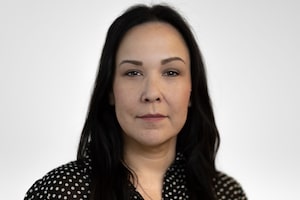Anna Betty Achneepineskum, left, isn’t convinced that the latest report aimed at reforming the Thunder Bay police and its board will lead to meaningful change.David Jackson/The Globe and Mail
The Deputy Grand Chief of Nishnawbe Aski Nation in Northern Ontario says selecting an Indigenous police chief to lead the Thunder Bay Police Service out of crisis could help restore trust and faith in the embattled force. But Anna Betty Achneepineskum isn’t convinced that the latest report aimed at reforming the service and its board will lead to meaningful change.
“How many pages are we going to turn?” she asked, referring to the title of the interim report, Turning The Page, an Urgent Memo to the Thunder Bay Police Services Board, which was presented to the police board on Tuesday.
The report was authored by a panel led by former Toronto Police Services Board chair Alok Mukherjee and several other policing and governance experts. The report contains recommendations related to the hiring of a new police chief, board appointments and structure, and internal labour relations.
More Indigenous representation on the board is among the key proposals.
The interim report comes four years after two other extensive investigations by the province’s policing oversight agencies – the Office of the Independent Police Review Director and the Ontario Civilian Police Commission. The OIPRD Broken Trust report by Gerry McNeilly and OCPC report by former senator Murray Sinclair produced dozens of recommendations in 2018 but there’s been little to no progress.
The long-standing dysfunction within Thunder Bay Police led to Ms. Achneepineskum calling for the dismantling of the force after years of systemic racism evidence contained in the mounting pile of reports and recommendations.
Radical change is overdue for the Thunder Bay Police Service and board
After reviewing the latest report from Mr. Mukherjee and his panel, she said she stands by her call and still wants the Ontario Provincial Police to take over services.
But dismantling is not a recommendation included in the interim report that says a regional hub approach to policing in Thunder Bay is the way to go, and its last hope.
At the board meeting Tuesday, there was some discussion about how the board could move ahead with the immediate recommendations that are focused on hiring a new police chief with an ideal profile, changes to board appointments, including expanding membership roles, and improving internal labour relations with a new human-rights and equity, diversity and inclusion office.
The OCPC appointed Malcolm Mercer as the administrator of the board last spring. It also investigated suspended police chief Sylvie Hauth amid allegations of misconduct that were recently substantiated.
Mr. Mercer reported to the OCPC in August that simply bringing in a new chief and police board won’t lead to the change needed, and agreed with the recommendations put forth by the latest panel on how to ensure strong leadership through effective governance.
“I think these [governance recommendations], from my point of view as administrator, are harmonious with my interim report to indicate, in my view, that the board is not really equipped to effectively do the job that it’s asked to do. And it should be no surprise that it doesn’t do that effectively,” Mr. Mercer told the board Tuesday.
The panel suggests expanding the current five-member board to at least seven members, and that there be at least two to three First Nations seats representing the local Fort William First Nation and remote communities further north. It also calls for a full-time paid chair position with a term of five years.
Ms. Achneepineskum said First Nations representation will only be effective if they are protected against the risk of harassment from the board and service as well as tokenism.
“We’re not going to be throwing anyone to the wolves,” she said about past Indigenous board appointments.
Ms. Achneepineskum also said city council should only have one seat on the board, not three.
“To me they’ve lost their credibility to represent on that board,” she said, referring to the number of recommendations and reports that have been a collective failure. “They have contributed to the dysfunction and chaos.”
Georjann Morriseau is the last of three sitting board members whose terms will be up by November (two provincially appointed seats are vacant.) The former chief of Fort William First Nation was appointed by the city, and last year filed a human-rights complaint against the service and board for harassment and discrimination. Several former and current officers followed suit and filed their own human-rights complaints against senior leadership and the board, also alleging harassment and discrimination.
Chantelle Bryson, the Thunder Bay lawyer representing 11 officers and their human-rights complaints, said the interim report is a slap in the face to her clients who met with the panel, and that the recommendations won’t solve the policing problems within the senior ranks.
“There comes a time when an organization resistant to change requires people to leave the building. That’s what’s required here,” Ms. Bryson said.
She also said an arm’s-length human-rights office under the senior leadership’s direction is not really arm’s-length and “will change absolutely nothing.”
“The only thing that will change it is accountability. When people get fired, the rest of the people look around and go, okay, I better change my behaviour,” she said. “Until the problem people are out of the building and there’s actual accountability, this report is empty.”
 Willow Fiddler
Willow Fiddler